American Meat - Unfinished Film
Documentary About Current State Of Food & Farming
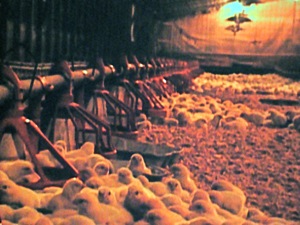 Film Making In Queens / Sunnyside Neighborhood / Food & Wine / Queens Buzz. I managed to obtain an invitation to a screening of American Meat, which is an unfinished documentary film, at Cafe Marlene in Sunnyside. The screening was sponsored by Queens Harvest Co-op, which is an organization working to build an organic food cooperative in Queens.
Film Making In Queens / Sunnyside Neighborhood / Food & Wine / Queens Buzz. I managed to obtain an invitation to a screening of American Meat, which is an unfinished documentary film, at Cafe Marlene in Sunnyside. The screening was sponsored by Queens Harvest Co-op, which is an organization working to build an organic food cooperative in Queens.
The film is a rather eye opening look into how the economics of food / meat production in this country have taken us down an unsustainable path. A path which not only has significant health implications, but possibly even more dire consequences. The film provides an intelligent, behind-the-scenes look at how economics have been driving: 1) food production methods, 2) the composition of what's in the meat being sold at the grocery store, and 3) what we're feeding our children and ourselves.
The film was envisioned and began production in the spring of 2007 and the producers are hoping to finish it in 2011. Click here to view our preview of the unfinished documentary film entitled American Meat independent film at Cafe Marlene in Sunnyside and hosted by Queens Harvest Co-op.
American Meat - Unfinished Film
Film About Current State Of Food & Farming
Film Making in Queens / Sunnyside Neighborhood / Food & Wine / Queens Buzz. Continued / If necessary use the search function to find the story introduction.
Agri-Business Chemical Vs Natural Family Farms
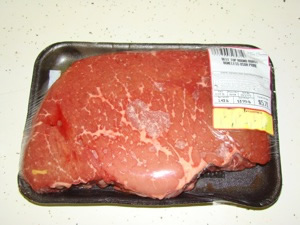 I just returned from the pre-screening an unfinished independent film about American food production. The film’s working title is American Meat. The film provides a history of American food economics, technology and production in the 20th and 21st centuries. And, perhaps more importantly, it provides a wake up call for how we can support some of the ingenious efforts being made by some small naturalist farmers and grocers who are seeking to de-toxify food production.
I just returned from the pre-screening an unfinished independent film about American food production. The film’s working title is American Meat. The film provides a history of American food economics, technology and production in the 20th and 21st centuries. And, perhaps more importantly, it provides a wake up call for how we can support some of the ingenious efforts being made by some small naturalist farmers and grocers who are seeking to de-toxify food production.
The unfinished documentary film opens by talking about how unaware the American people are about how their food is being produced. The film begins with the thesis that since meat is still generally the centerpiece of most American diets, it will takes us on a journey into the world of meat production in America.
Joel Salatin Of Polyface Farms Virginia
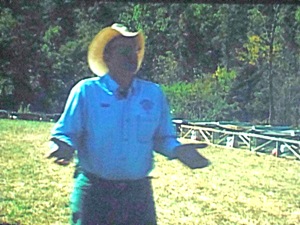 The film opens with footage of Americans shopping and eating lavish family style meals circa the 1960's to 1990's. We are brought into the behind-the-scenes story through a speech given by one of the leading pioneers in natural farming: Joel Salatin of Polyface Farms.
The film opens with footage of Americans shopping and eating lavish family style meals circa the 1960's to 1990's. We are brought into the behind-the-scenes story through a speech given by one of the leading pioneers in natural farming: Joel Salatin of Polyface Farms.
Joel is all farmer and part preacher. He’s an educated and inventive farmer who believes we don’t have to 'produce food commodities', but can grow food like our grandparents did. He’s against using anti-biotics, growth hormones and confinement food production methods. Joel was also featured in a related film about the same topic, Food Inc..
Food Production Models - Agri-Business Vs Natural
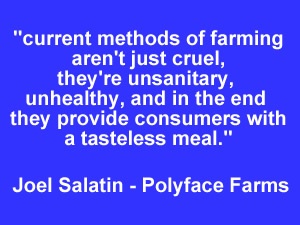 He, and other naturalists like him, make the claim that the current methods of American food production aren’t just cruel, they’re unsanitary, unhealthy and in the end provide consumers with a tasteless meal.
He, and other naturalists like him, make the claim that the current methods of American food production aren’t just cruel, they’re unsanitary, unhealthy and in the end provide consumers with a tasteless meal.
The film's crew delves into the natural and organic world of farming by interviewing a number of small, generally family-based farmers. Many of the farmers had once used agri-business methods of food production, but over time these farmers found these methods to feel just plain wrong. Hence many of them started to seek alternative ways to make natural farming work economically.
The documentary is broken into three segments: 1) Where We Are, 2) Something’s Happening and 3) It’s Up To Us.
I. Where Are We?
This section of the film takes us into current food production methods, the economics of these methods and the potentially unsustainable nature of them. In the process of making us aware of our current predicament [where we are], we’re informed about how we got here too.
History Of American Meat Production / Technology
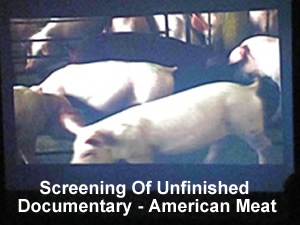 According to the film, currently 99% of the meat produced in this country is done via ‘confinement farming'. The first animals / food to be brought indoors in order to increase food productivity were chickens and eggs in the late 1950's and 1960's. The chickens were enclosed [some say incarcerated] in cramped buildings where they eat, sleep and defecate with many other chickens. The chickens are fed growth hormones to hasten their growth and ultimate consumption by human beings. And because the chickens don’t get out in the sunlight, don’t get much exercise and live so closely together – many of them get sick and eventually die from that sickness. In the 1970's pigs were brought indoors to increase the pork production. Now most animals are given anti-biotics and growth hormones to increase food production. The photo above is a still taken from the unfinished documentary American Meat.
According to the film, currently 99% of the meat produced in this country is done via ‘confinement farming'. The first animals / food to be brought indoors in order to increase food productivity were chickens and eggs in the late 1950's and 1960's. The chickens were enclosed [some say incarcerated] in cramped buildings where they eat, sleep and defecate with many other chickens. The chickens are fed growth hormones to hasten their growth and ultimate consumption by human beings. And because the chickens don’t get out in the sunlight, don’t get much exercise and live so closely together – many of them get sick and eventually die from that sickness. In the 1970's pigs were brought indoors to increase the pork production. Now most animals are given anti-biotics and growth hormones to increase food production. The photo above is a still taken from the unfinished documentary American Meat.
Confinement Farming - Farming Economics 101
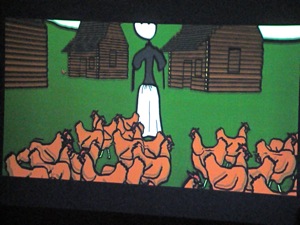 The economic benefit of the confinement farming approach to food production is that one farmer can ‘produce’ so many more chickens than a natural / organic farmer because confinement farming requires far less manpower. In the 1970’s a man could take care of 500 pigs by working all day. Now a man can take care of 10,000 pigs in two hours. This sort of productivity is also going on in the fields, where one man and manage three times the acreage he could just 20 years ago.
The economic benefit of the confinement farming approach to food production is that one farmer can ‘produce’ so many more chickens than a natural / organic farmer because confinement farming requires far less manpower. In the 1970’s a man could take care of 500 pigs by working all day. Now a man can take care of 10,000 pigs in two hours. This sort of productivity is also going on in the fields, where one man and manage three times the acreage he could just 20 years ago.
These productivity increases are not without the incurrence of additional costs, as to enable these productivity increases the farmers must make significant investments in new facilities, equipment and technology.
It wasn't lost on the people in the film, that one of the reasons that people are leaving small towns because there aren't any jobs any more. The film says that 65% of all farmers are over the age of 65, while less than 5% are under the age of 35, leaving only 30% of farmers at ages in between.
Confinement Farming - Farming Finance 101
The film then begins to document all of the additional costs involved in this approach to farming. One farmer interviewed, told us about investing $175,000 for each confinement building. He also told us that he had to invest in expensive heating and cooling systems, computers to monitor the confinement centers, agri-business fertilizer, and oil company energy bills. Confinement farmers have to heat confinement buildings up to 90 degrees for baby chickens and then air condition / cool them as the chickens grow.
While these modern farming technologies enable confinement farmers to run their farms with very few people, it costs them a bundle to keep everything running. One of a confinement farmer's most important jobs is to find the sick or most anemic looking animals, so he can pull them out of the confinement center before they infect the other animals. As several farmers remarked in the film, this is not the way they want to farm.
Confinement Farming - Is It Sustainable?
Animal mortality rates in confinement farms are far higher than in natural farms. In one case a farmer noted that he had mortality rates as high as 50% which he explained, "is unsustainable".
The film raises the question of whether current methods of food production are sustainable because the methods being used are not in harmony with nature. Some of the issues cited were the death rates, the high cost of fueling these types of farms, and the cost of chemical fertilizers.
Confinement Farming - The Risks & The Profits
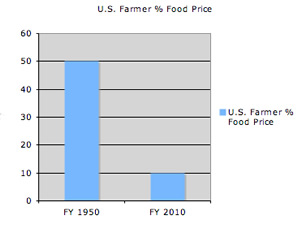 In some cases the animals farmers take care of [or ‘produce’] are owned by large food producers. The farmers get paid based on how much weight the animals gain [or how much the farmer ‘grows’ the animals]. The farmers take all the financial risks by investing in all of the infrastructure mentioned above. According to the film farmers net about 10% of the price paid by the consumer for the food they grow versus about netting about 50% of the consumer price in the 1950's. In the chart to your left you can see how the American farmer's share of the food pie has shrunk from 1950 - 2010.
In some cases the animals farmers take care of [or ‘produce’] are owned by large food producers. The farmers get paid based on how much weight the animals gain [or how much the farmer ‘grows’ the animals]. The farmers take all the financial risks by investing in all of the infrastructure mentioned above. According to the film farmers net about 10% of the price paid by the consumer for the food they grow versus about netting about 50% of the consumer price in the 1950's. In the chart to your left you can see how the American farmer's share of the food pie has shrunk from 1950 - 2010.
Demand For American Food Falls - Then What?
In the 21st century there's been a decline in global demand for American food as many of the emerging world powers like China, India and Brazil have began producing enough food to begin competing with America for exports. The pork commodity market was the first to decline, early in the 21st century. The chicken market was next to fall beginning its slide in 2008. The film informs us through interviews that the farmers who had invested in the farming assets mentioned above, were left with many loans to pay, and less income with which to pay them.
II. Something’s Happening - Food In America
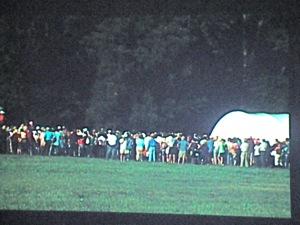 There's an old Buffalo Springfield tune entitled Something’s Happening Here. The lyrics to the song go as follows:
There's an old Buffalo Springfield tune entitled Something’s Happening Here. The lyrics to the song go as follows:
... “something’s happening here, what it is ain’t exactly clear … watch children, what’s that sound, everyone look what’s going down” ...
The song was written in the 1970's about the Vietnam War, and about why the U.S. government was sending the nation’s young men to fight in another country's [Vietnam] civil war. It invoked everyone to pay attention to what the government was doing, and asked them if this course of action made sense to them. Eventually the people decided that America should exit the war in southeast Asia. The photo to your left shows a gathering that takes place at Polyface Farms every year or two. Joel Salatin has become an important figure in the all natural / organic farming movement. He was featured in the documentary Food Inc. and this documentary film will raise his profile even more. Joel Salatin is shown in the photo below.
Making The Switch - When Taste [& health] Matter
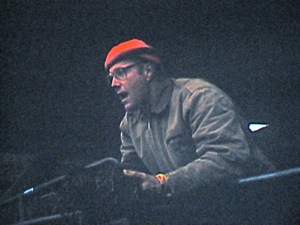 This section of the film calls on people to pay attention to what they’re eating. It encourages people to become more aware about how their food is produced. According to the farmers interviewed in the film, the difference in taste and health makes buying all natural and organic food well worth the higher prices. It's just simply better tasting and healthier food.
This section of the film calls on people to pay attention to what they’re eating. It encourages people to become more aware about how their food is produced. According to the farmers interviewed in the film, the difference in taste and health makes buying all natural and organic food well worth the higher prices. It's just simply better tasting and healthier food.
In the film, the something that’s happening here harks back to the farmer / preacher we met earlier in the film: Joel Salatin of Polyface Farms. Joel’s father never bought into the ‘agri-business’ method of farming because he thought it wasn’t healthy. Joel recalls his father asking him if he really wanted to be a farmer, at a time when the mass media was poking fun of the 'hicks' who were working so hard to feed them.
Joel decided he really wanted to be a farmer and that he was up to the challenging economic times that lie ahead. So Joel became a farmer and devised a farming system that doesn’t require tons of fuel from the oil companies, nor much by way of chemicals from large multi-national agri-business companies and not as much investment in equipment and buildings either. Some might call Joe's method of farming good old-fashioned farming, updated with some American ingenuity for these modern times.
The Pigaerator – Making All Natural Fertilizer
 The film documents how Joel pulls his cattle into the barns over the winter, where they eat hay and excrete manure. Over the course of the winter he drops corn husks into the manure so that it gets mixed in with it. In the spring, Joel lets his cattle out into the fields and pulls his pigs into the barn where they scrounge through the manure to find the corn husks left over the winter. This pig process 'aerates' the fertilizer - hence the name 'pigaerator'. Joe notes that during this process that the pigs "are happier than pigs in sh_t".
The film documents how Joel pulls his cattle into the barns over the winter, where they eat hay and excrete manure. Over the course of the winter he drops corn husks into the manure so that it gets mixed in with it. In the spring, Joel lets his cattle out into the fields and pulls his pigs into the barn where they scrounge through the manure to find the corn husks left over the winter. This pig process 'aerates' the fertilizer - hence the name 'pigaerator'. Joe notes that during this process that the pigs "are happier than pigs in sh_t".
In the fall, after the pigs are let out of the barn, Joel gathers the mix of manure and pig droppings and plows them into the fields following the harvest. This provides an all natural organic fertilizer that is far less expensive than purchasing chemicals. Farmer Joel says it's likely far better for the environment [no chemical drainage into the water table] and enables the growing of far healthier animals and food because they're all natural and have been grown without chemicals. The film shows how in spring time Joel’s fields are a vibrant, naturally fertilized green. Joel tells us, no chemicals, no confinement, healthy happy animals that breath fresh air and gets some exercise. Happy meal anyone?
This natural approach to farming reduces both fixed costs and operating costs because there aren't any expensive confinement buildings [old fashioned barn], no expensive heating / cooling / computer systems [the animals are raised naturally using their own body warmth], no expensive fuel to operate these systems, and no expensive purchases chemical fertilizers. All natural, similar to the way things used to be done in the old days.
The Egg Mobile – Organic Eggs & Compost
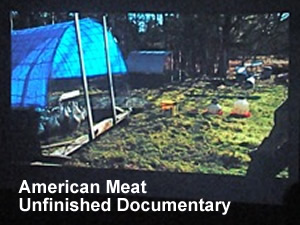 Joel grazes his cows on fresh pastures every day. He moves them from spot to spot which he calls [PLOTS]. The day after they leave one plot he sends in the chickens who hover over the cow manure eating all of the flies and bugs the manure attracts. This is a natural chicken feed. At the end of each day Joel collects the chickens back into the truck where they lay their all natural eggs. Joe says this allows his chickens to express “their chickeness”. An egg mobile is shown in the photo to your left. The chicken coop is moved with a tractor or truck from plot to plot.
Joel grazes his cows on fresh pastures every day. He moves them from spot to spot which he calls [PLOTS]. The day after they leave one plot he sends in the chickens who hover over the cow manure eating all of the flies and bugs the manure attracts. This is a natural chicken feed. At the end of each day Joel collects the chickens back into the truck where they lay their all natural eggs. Joe says this allows his chickens to express “their chickeness”. An egg mobile is shown in the photo to your left. The chicken coop is moved with a tractor or truck from plot to plot.
Organic Chickens & Eggs - Why Chefs Want Them
Chefs from the surrounding Washington DC area [Joel operates his farm in Virginia] buy his eggs and swear by them. One chef described the difference, "The eggs that are ‘produced’ have thin shells, the whites are runnier and the yolk is plain. Eggs from Polyface Farms, have thicker shells, thicker whites and vibrant yellow yolks. And they taste much, much better."
Joel also processes his chickens on his own farm because he hasn’t found a food processor who does it in a way that satisfies him. So he showed us how he slits the chicken throats, puts them into a ‘scalder’ which is very hot water where they become de-feathered. They then cut off their heads and legs, gut them and put them into chill tanks. Chicken soup anyone?
Natural & Organic Farming Logistics & Economics
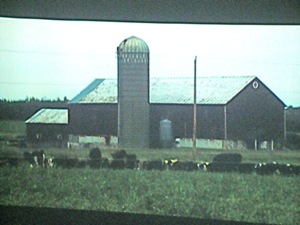 The film tells us that currently only one percent of all animals are raised outside because it costs more to care for them. The film's producers did some math using Joel Salatin's farm production numbers. Joel produces 319,000 lbs of meat on 1,550 acres. The average American annually consumes 48 lbs of pork, 60 lbs of beef and 82 lbs of chicken. Based on Joel's level of production, and current American meat consumption, it would take 286 million acres to produce the 59 billion lbs of meat consumed in America every year. Today there is about one billion acres of farmland in the U.S. Hence, the film concludes, theoretically producing food Joel’s way is possible. The farm shown in the photo to your right is a traditional farm which grows, not produces, food.
The film tells us that currently only one percent of all animals are raised outside because it costs more to care for them. The film's producers did some math using Joel Salatin's farm production numbers. Joel produces 319,000 lbs of meat on 1,550 acres. The average American annually consumes 48 lbs of pork, 60 lbs of beef and 82 lbs of chicken. Based on Joel's level of production, and current American meat consumption, it would take 286 million acres to produce the 59 billion lbs of meat consumed in America every year. Today there is about one billion acres of farmland in the U.S. Hence, the film concludes, theoretically producing food Joel’s way is possible. The farm shown in the photo to your right is a traditional farm which grows, not produces, food.
Joel has a diversified income stream as he’s selling chickens, eggs, pigs and cows and growing a good lot of their feed and fertilizer on his farm. Polyface Farms doesn’t take any subsidies from the U.S. government. Joel’s farm grosses $2 million dollars per annum and employs twenty people.
Last year the U.S. government doled out about $15 billion to ‘farmers’, many of which are now large agri-business corporations. The government’s stated goal is to keep the price of food inexpensive for the average American consumer.
Other Examples Of Organic / All Natural Farms
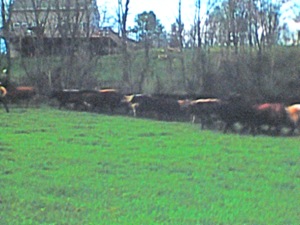 Another farmer in the southeast grazes 200 'happy' cows using Joel’s farming techniques. The farmer says in the film that, "I used to be a redneck who never went into a fruit and nuts place. Those were for hippies. Today, I am one of them."
Another farmer in the southeast grazes 200 'happy' cows using Joel’s farming techniques. The farmer says in the film that, "I used to be a redneck who never went into a fruit and nuts place. Those were for hippies. Today, I am one of them."
A farmer in Massachusetts started doing mobile farming moving the chicken coop from plot to plot. He says in the film that "The fertilizer has greatly improved both the yield and the taste of the food I grow". The photo to your left shows some 'happy cows' that are raised naturally.
Running A Concentration Camp For Animals
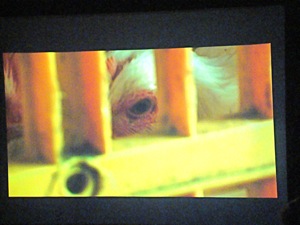 In Wisconsin a farming family that used to farm the old way, tried the agri-business method of food production. The farmer commented that confinement farming seemed to be like "running a concentration camp for animals". In the photo to your right is a still showing a chicken on a confinement farm - from the unfinished documentary American Meat.
In Wisconsin a farming family that used to farm the old way, tried the agri-business method of food production. The farmer commented that confinement farming seemed to be like "running a concentration camp for animals". In the photo to your right is a still showing a chicken on a confinement farm - from the unfinished documentary American Meat.
The farmer said, "It [confinement farming] was impressive on paper, but after the bills were paid, there was little left for the ones who’d taken all the risks and done all the work". This farm family decided to return to natural farming, without all the buildings, equipment, hormones, anti-biotics and heavy use of gasoline.
III. It’s Up To Us
This segment is dedicated to the people watching the film. It notes the importance of understanding how one's food is produced as it has many implications, especially for our young. The implications range from health issues, such as the long term impact of eating meat grown using hormones, anti-biotics and other chemicals, to the environmental impact of agri-business chemicals and fertilizers. And the film pointed out that taste, is actually a signal for what is the right thing to do.
Paying The Price - Buying Organic / All Natural Food
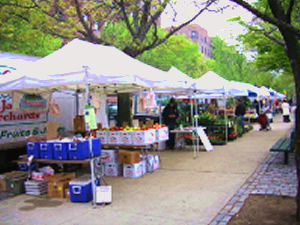 The film notes that the people watching the film can do something by supporting natural farmers by paying a little more to buy organic and all natural foods at the stores and restaurants that sell it. Farmers markets are another way to support local farms as in this case the farmers take in 100% of the revenue. And another means of supporting organic / all natural is through community supported agriculture or CSA's. CSA's are buying groups, wherein farmers are paid up front and CSA members are then paid 'dividends' of food from the harvest throughout the growing season [use search to find farmers markets and CSA's in Queens on this site]. CSA's have a social element to them too.
The film notes that the people watching the film can do something by supporting natural farmers by paying a little more to buy organic and all natural foods at the stores and restaurants that sell it. Farmers markets are another way to support local farms as in this case the farmers take in 100% of the revenue. And another means of supporting organic / all natural is through community supported agriculture or CSA's. CSA's are buying groups, wherein farmers are paid up front and CSA members are then paid 'dividends' of food from the harvest throughout the growing season [use search to find farmers markets and CSA's in Queens on this site]. CSA's have a social element to them too.
The possibilities are exciting, but the economics of farming can be daunting. Right now, most small family farmers are just trying to survive. And the film's message is that ultimately it's the economics that will drive what the farmers do.
A few large companies have begun to take notice. Whole Foods and Chipotle were mentioned as two companies working to cut deals with smaller farmers to put organic / all natural food in consumers' hands.
A little more than a century ago about half the nation was involved in food production. Today less than one percent of the nation is. The film asks whether people will return to farming jobs and concludes that the answer depends on whether people can make a decent living farming. And that depends on farming economics.
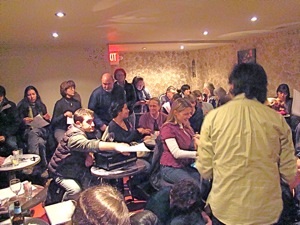 At the end of this unfinished cut of the film, Joel Salatin talks about going from an agrarian economy, to an industrial economy, to an information economy to a regenerative economy. He says, "Let's start with schools and hospitals and go from there".
At the end of this unfinished cut of the film, Joel Salatin talks about going from an agrarian economy, to an industrial economy, to an information economy to a regenerative economy. He says, "Let's start with schools and hospitals and go from there".
Based on the enthusiastic applause from the audience, I’m inclined to think that this film could be a big winner. It seems to be an intelligent effort to clearly lay out what's going on with our food supply and what we as consumers can do to help shift the balance in favor of natural food. As the film says, there's something happening here. In the photo to your left the audience hands in their film feedback forms.
Comments - Unfinished Film American Meat
It will be interesting to see where the unfinished film goes from here. One could say that there's easily enough in this film already to give people plenty to think about. But that said, it begs other questions. For example what is known to date about the ill effects of food produced like this?
It's worth noting that in a related food production tangent, the National Institute of Health recently found that at least two pesticides used by fruit and vegetable growers may be a potential cause of Parkinsons.
The film makers could also try to interview large producers of chicken and pork, like Purdue or Pilgrims Pride, to get their comments on their methods of food production and the potential ill effects on human health and the environment. If nobody will speak to them they could try to get interviews with these companies in a Michael Moore style to at least provide some sort of record.
Thanks To The Following
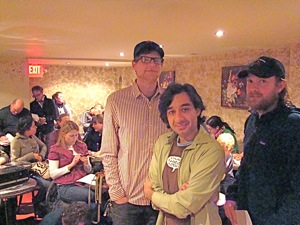 The pre-screening of this unfinished film was hosted at Café Marlene in Sunnyside and sponsored by Queens Harvest Co-op.
The pre-screening of this unfinished film was hosted at Café Marlene in Sunnyside and sponsored by Queens Harvest Co-op.
The film, American Meat, is being made by three people hailing from three NYC boroughs: Manhattan, Queens and Brooklyn. The project started four years ago, in the spring of 2007, when Graham Meriwether, director, started shooting footage for the film. He was joined in the fall of 2007 by Memo Salazar who began helping him with some of the writing and editing. And about year ago, Ryan Nethery joined them as the producer / cinematographer. The film makers are shown in the photo to your right [they were named above from right to left].
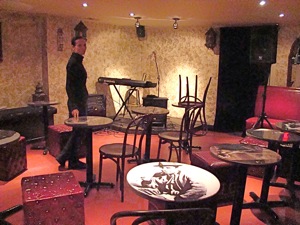 The screening was designed to gather feedback regarding how to finish the film. The screening lasted about an hour and a half, and was followed by an audience feedback session. The small theater in the subterranean level of Cafe Marlene in Sunnyside was packed, as you can see in the photos above, and unfortunately I was one of those left standing. The good news is that the film was engaging enough to make the time fly by. The Cafe Marlene screening room several days before the screening is shown in the photo to your left.
The screening was designed to gather feedback regarding how to finish the film. The screening lasted about an hour and a half, and was followed by an audience feedback session. The small theater in the subterranean level of Cafe Marlene in Sunnyside was packed, as you can see in the photos above, and unfortunately I was one of those left standing. The good news is that the film was engaging enough to make the time fly by. The Cafe Marlene screening room several days before the screening is shown in the photo to your left.
We have the Queens Harvest Food Co-op to thank for sponsoring this event. The Queens Harvest Food Co-op is planning to open an organic / all natural food co-op in Queens - although the timing depends on a number of things including finding a location and obtaining adequate financing.
Sunnyside Neighborhood / Woodside Neighborhood Links
Click on these advertisements for promotions, discounts and coupons by retailers and restaurateurs in Woodside, Sunnyside and nearby Queens.
Click this link to go to the:
Sunnyside & Woodside Neighborhood
Sunnyside Business Directory or Woodside Business Directory
Sunnyside & Woodside Real Estate or Events & Things To Do In Sunnyside & Woodside
Restaurants In Sunnyside & Woodside or Sunnyside & Woodside Shops & Shopping
Site Search Tips. 1) For best results, when typing in more than one word, use quotation marks - eg "Astoria Park". 2) Also try either singular or plural words when searching for a specific item such as "gym" or "gyms".
$element(bwcore,insert_search,N)$
Click this link to search for something in our Queens Business Directory. Also check out Taste of Sunnyside.
Click the log in link below to create an ID and post an opinion.
Or send this story to a friend by filling in the appropriate box below.















